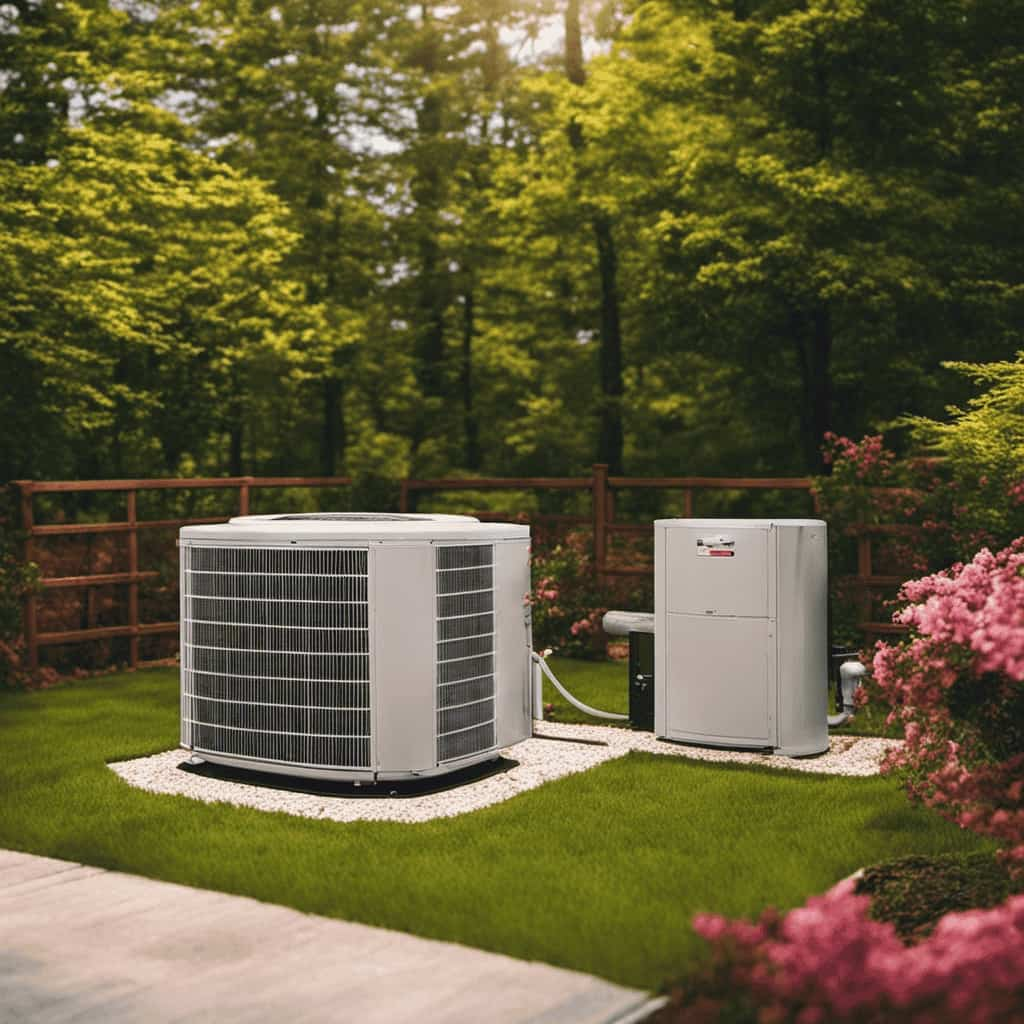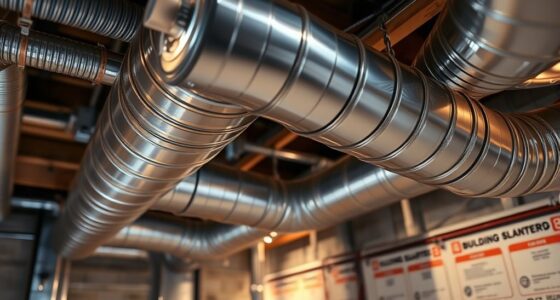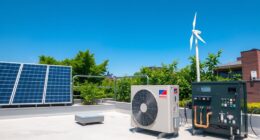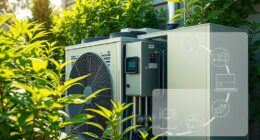We have the complete guide to maximizing efficiency with heat pump HVAC systems. Prepare to delve into the technical realm of heat pumps and uncover the tips for optimizing their performance for peak efficiency.
From understanding the benefits of energy-efficient heat pumps to choosing the right size for your home, we’ll cover it all.
Plus, we’ll share expert tips on maintenance, energy savings, and troubleshooting common issues.
Don’t miss out on this invaluable resource for heat pump owners. Let’s get started!

Key Takeaways
- Dual fuel systems combine a heat pump with a backup furnace or boiler for optimal performance and energy savings.
- Energy efficient heat pumps can significantly reduce energy consumption and lower utility bills.
- Proper heat pump sizing ensures optimal performance and energy efficiency.
- Regular maintenance and care are essential for optimal performance and longevity of heat pump HVAC systems.
Understanding Heat Pump HVAC Systems
We frequently use heat pump HVAC systems to efficiently heat and cool our homes. Heat pump technology advancements have made these systems even more efficient and reliable over the years. One notable advancement is the development of dual fuel systems, which combine a heat pump with a backup furnace or boiler.
These systems provide the benefits of both electric heat pumps and fossil fuel heating systems. During mild weather, the heat pump operates on its own, using electricity to extract heat from the outdoor air and transfer it indoors. When temperatures drop significantly, the dual fuel system automatically switches to the backup fossil fuel heating system for added efficiency and comfort. This dual fuel capability ensures optimal performance and energy savings throughout the year.
Now, let’s delve into the benefits of energy efficient heat pumps and how they contribute to maximizing efficiency in our homes.
Benefits of Energy Efficient Heat Pumps
To maximize efficiency in our homes, it is important to consider the benefits of using energy efficient heat pumps. Not only do these systems provide effective heating and cooling, but they also offer several environmental and financial advantages. Energy efficient heat pumps can help reduce greenhouse gas emissions and lower our carbon footprint, making them a more sustainable choice for heating and cooling needs. Additionally, many governments and utility companies offer incentives and rebates for installing energy efficient heat pumps, which can help offset the initial cost of the system. These incentives, combined with the long-term energy savings, make energy efficient heat pumps a cost-effective and environmentally friendly option for homeowners. The table below highlights some of the key benefits of energy efficient heat pumps.
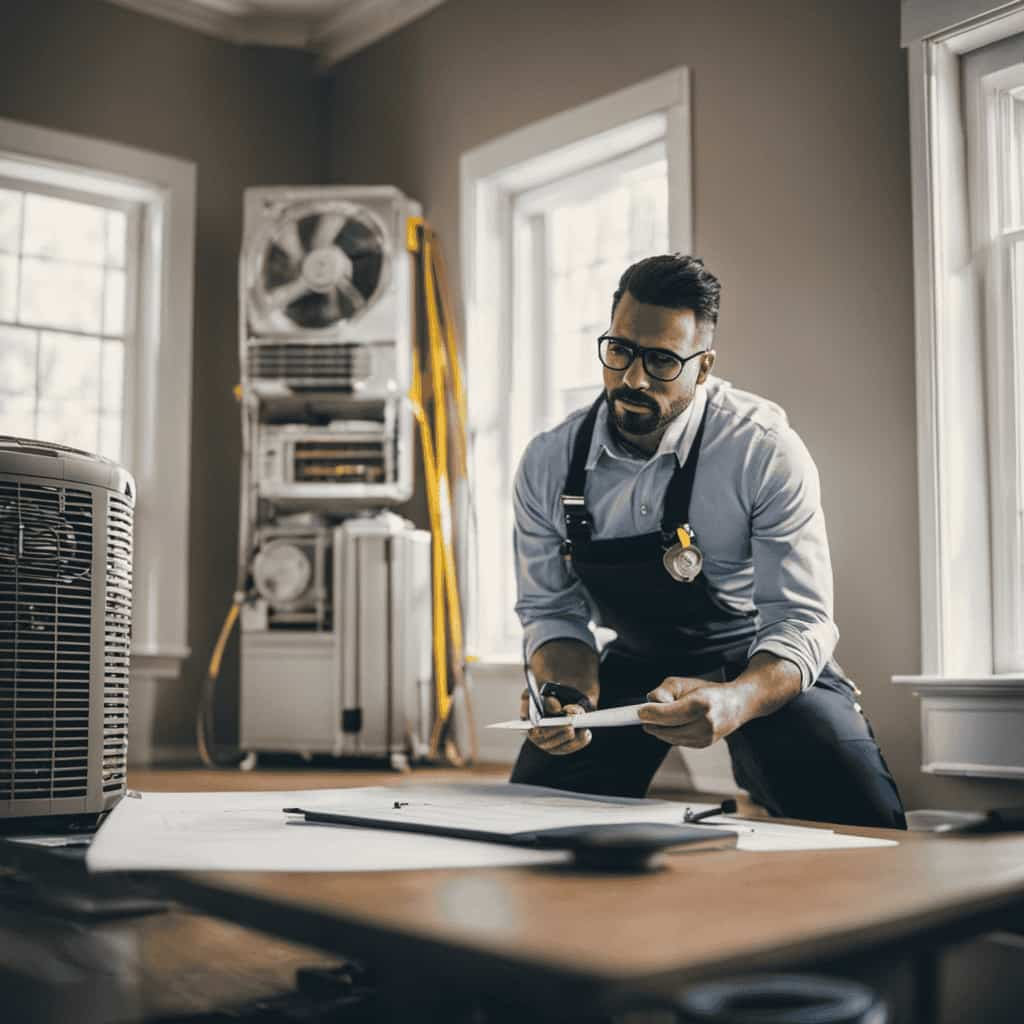
| Benefits | Description |
|---|---|
| Energy savings | Energy efficient heat pumps can significantly reduce energy consumption and lower utility bills. |
| Environmental friendliness | Heat pumps produce fewer greenhouse gas emissions compared to traditional heating and cooling systems. |
| Cost savings | Incentives and rebates for energy efficient heat pumps can help offset the initial installation cost. |
| Versatility | Heat pumps can provide both heating and cooling, offering year-round comfort in one system. |
| Durability | Energy efficient heat pumps are built to last, reducing the need for frequent repairs or replacements. |
Choosing the Right Size Heat Pump for Your Home
When choosing the right size heat pump for your home, it’s crucial to consider proper sizing, efficiency, performance, cost considerations, and potential savings.
Proper heat pump sizing ensures optimal performance and energy efficiency, as an undersized or oversized unit can lead to inefficiencies and higher energy bills.
Additionally, evaluating the cost of the heat pump and potential savings over its lifespan is important to make an informed decision.
Proper Heat Pump Sizing
Finding the proper size heat pump for our home is crucial for maximizing efficiency and ensuring optimal performance. Heat pump sizing is determined by factors such as the square footage of the house, insulation levels, climate, and the desired temperature range. Installing a heat pump that is too small will result in inadequate heating or cooling, while a heat pump that is too large will cycle on and off frequently, leading to energy wastage and reduced comfort.

To determine the right size heat pump for your home, it is important to conduct a proper load calculation. This calculation takes into account the heat loss and heat gain of the house, considering factors such as windows, doors, insulation, and ventilation. A qualified HVAC professional can perform this calculation and recommend the appropriate size heat pump for your specific needs.
Here is a table outlining the general guidelines for heat pump sizing based on square footage:
| Square Footage | Heat Pump Capacity |
|---|---|
| Up to 1,000 | 1.5 – 2.5 tons |
| 1,000 – 1,500 | 2.5 – 3 tons |
| 1,500 – 2,000 | 3 – 4 tons |
| 2,000 – 2,500 | 4 – 5 tons |
| 2,500+ | 5+ tons |
Efficiency and Performance
Before purchasing a heat pump for our home, we need to ensure we choose the right size for optimal efficiency and performance. To evaluate the efficiency and performance of a heat pump, we can look at specific performance metrics and consider its energy consumption.
One important metric is the Coefficient of Performance (COP), which measures the ratio of heat output to energy input. A higher COP indicates greater efficiency. Additionally, we should consider the heating seasonal performance factor (HSPF) and the seasonal energy efficiency ratio (SEER). These metrics provide a comprehensive view of a heat pump’s efficiency throughout the year.
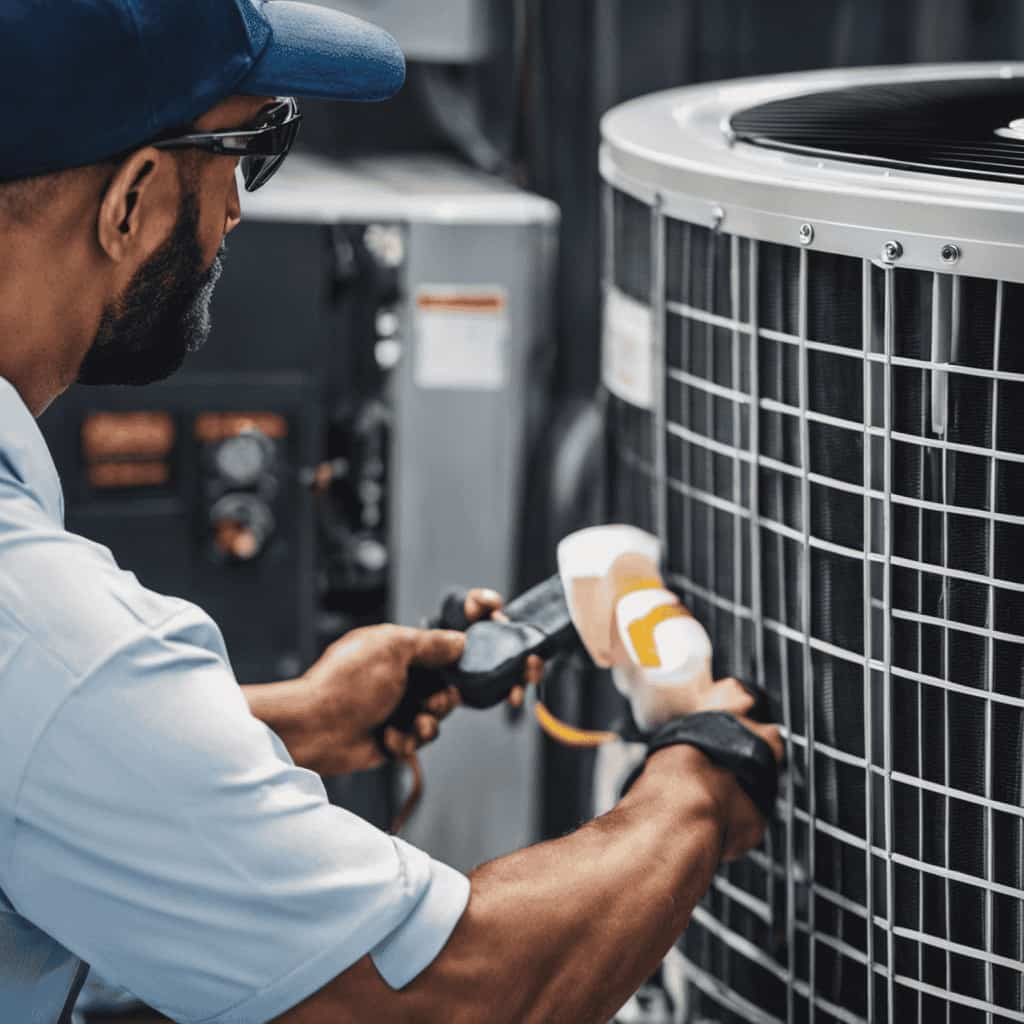
It’s essential to select a heat pump that matches the heating and cooling requirements of our home, as an oversized or undersized unit can lead to energy waste and decreased performance.
Cost Considerations and Savings
To maximize cost savings and ensure optimal performance, we must select the right size heat pump for our home. Choosing the correct size heat pump is crucial as it directly impacts both the upfront cost and long-term operational expenses. Conducting a cost analysis and considering the return on investment (ROI) is essential before making a purchase decision. Oversized or undersized heat pumps can lead to inefficiencies, decreased comfort, and increased utility bills. It is recommended to consult with a professional HVAC technician to accurately determine the appropriate size for your home. By investing in the right size heat pump, you can achieve maximum energy efficiency, lower operating costs, and a higher ROI.
| Size (Tons) | Heating Capacity (BTU) | Cooling Capacity (BTU) |
|---|---|---|
| 0.5 | 6,000 – 12,000 | 5,000 – 12,000 |
| 1.0 | 12,000 – 24,000 | 12,000 – 24,000 |
| 1.5 | 18,000 – 36,000 | 18,000 – 36,000 |
| 2.0 | 24,000 – 48,000 | 24,000 – 48,000 |
| 2.5 | 30,000 – 60,000 | 30,000 – 60,000 |
Table: Heat Pump Sizes and Corresponding Heating/Cooling Capacities.
Optimizing Heat Pump Performance for Maximum Efficiency
By adjusting thermostat settings and regularly maintaining the system, we can optimize heat pump performance and achieve maximum efficiency.
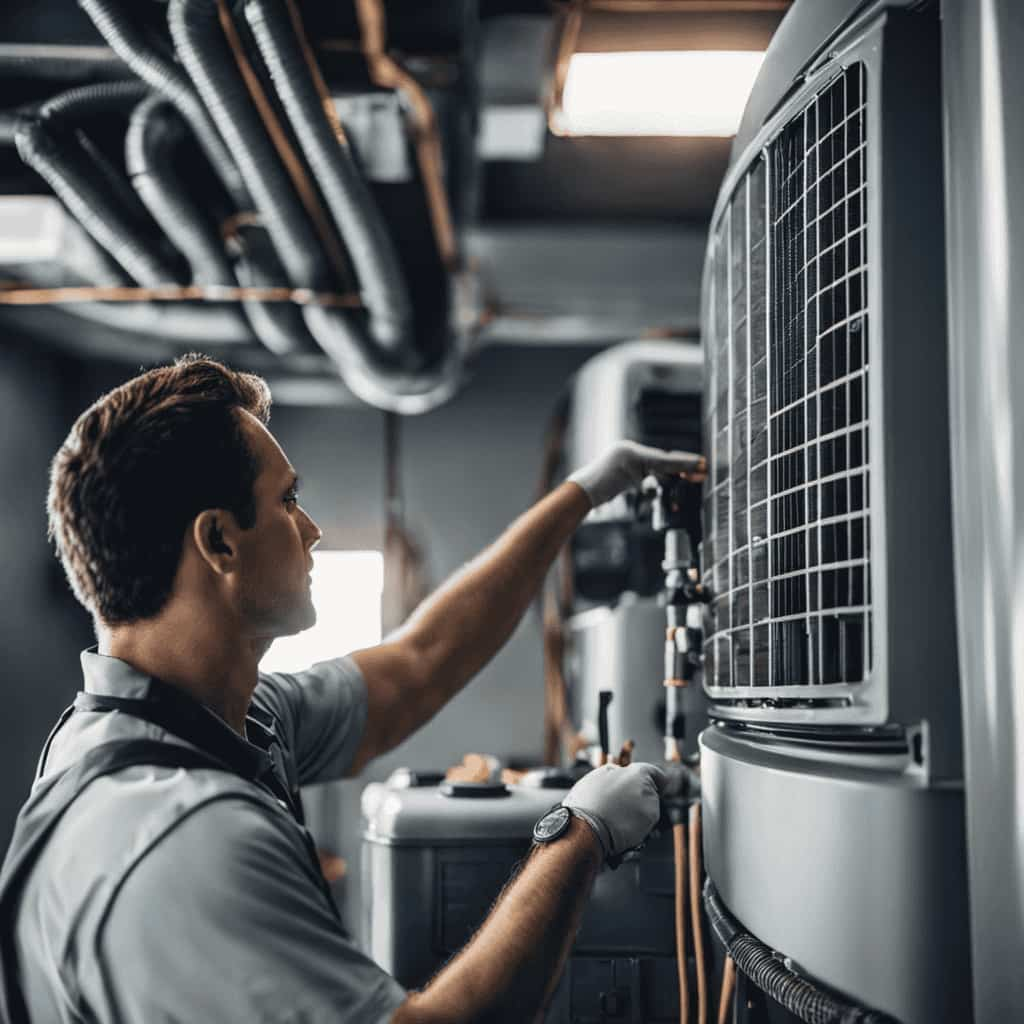
To further improve heat pump defrost, consider implementing the following measures:
Install a defrost control board: This device helps regulate the defrost cycle more accurately, reducing unnecessary defrosting and improving overall efficiency.
Clean the outdoor coil: Regularly removing dirt and debris from the outdoor coil improves heat transfer and prevents airflow obstruction.
Check refrigerant charge: Incorrect refrigerant levels can negatively impact heat pump performance. Ensuring proper refrigerant flow optimizes efficiency.
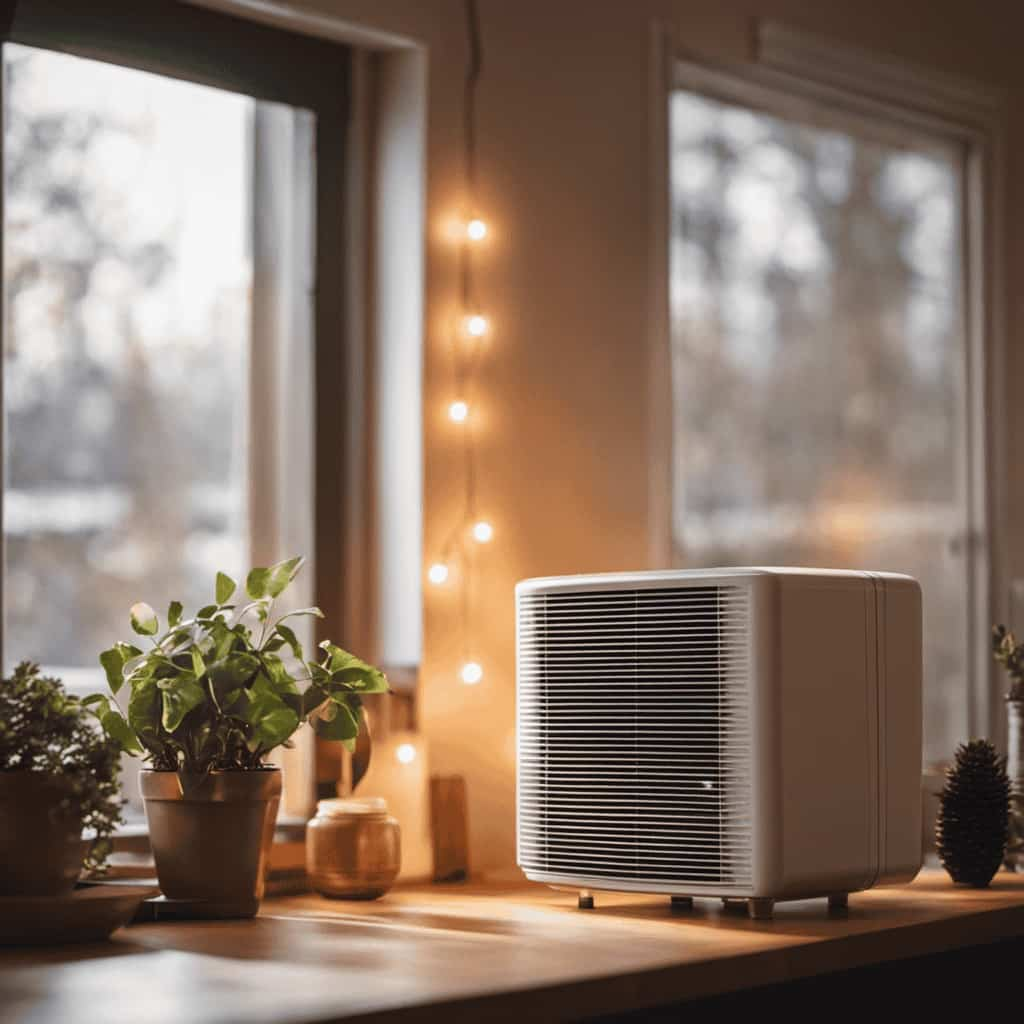
Insulate refrigerant lines: Properly insulating refrigerant lines minimizes heat loss during operation, improving overall system efficiency.
Maintain airflow: Regularly clean and replace air filters and ensure the supply and return registers aren’t obstructed, allowing for optimal airflow.
Implementing these strategies will maximize heat pump efficiency, resulting in increased energy savings and improved comfort.
Proper Maintenance and Care for Heat Pump HVAC Systems
Regular maintenance and care of our heat pump HVAC systems is essential for optimal performance and longevity. By following a few simple DIY maintenance tips, we can ensure that our systems continue to operate efficiently and reliably.
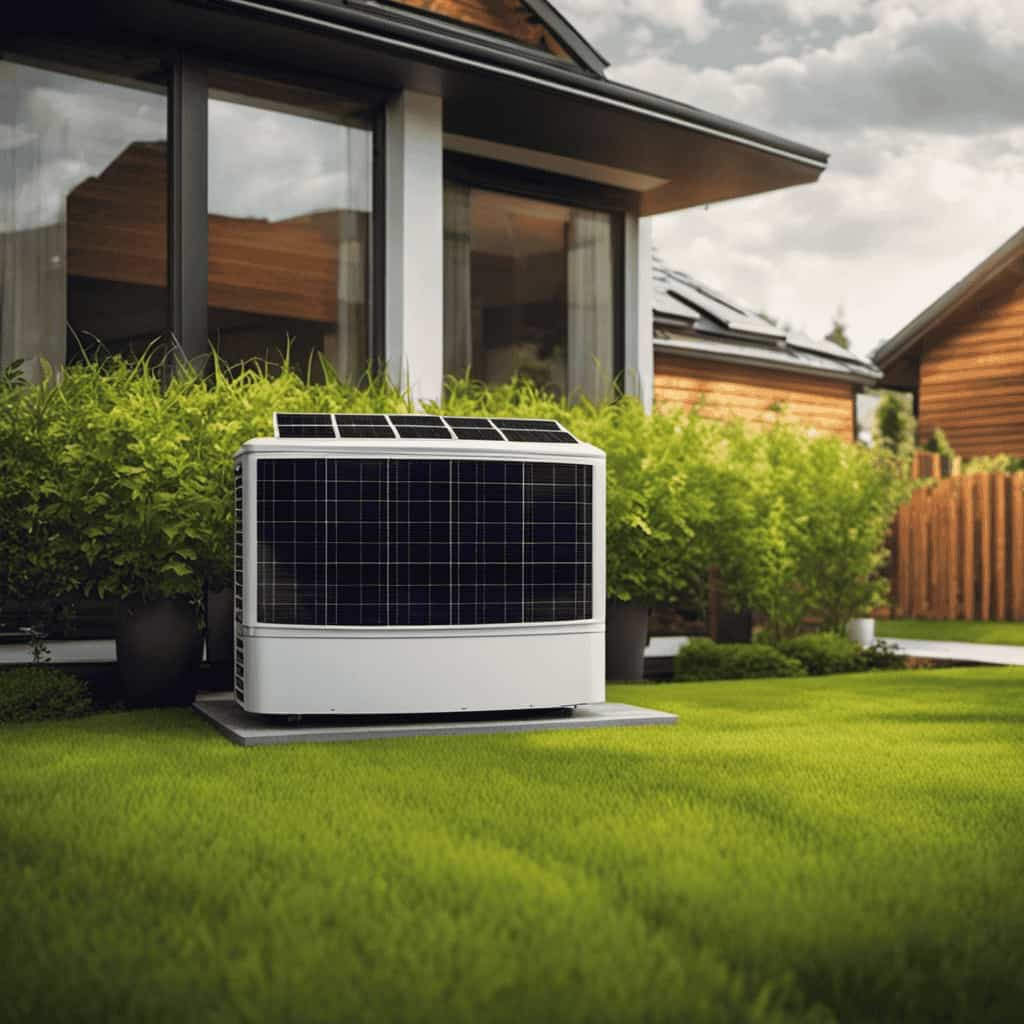
One of the most important steps in heat pump troubleshooting is to regularly clean or replace the air filters. Clogged filters can restrict airflow and reduce the system’s efficiency.
Additionally, it’s crucial to keep the outdoor unit free from debris such as leaves, grass, and dirt to prevent airflow obstructions.
Another important maintenance task is to check and clean the evaporator and condenser coils. These coils can accumulate dust and dirt over time, hindering heat transfer and reducing efficiency.
Energy Saving Tips for Heat Pump Owners
When it comes to maximizing the efficiency of our heat pump HVAC systems, there are several energy-saving tips that we, as heat pump owners, can incorporate into our daily routines.

First and foremost, setting the optimal temperature can make a significant difference in energy consumption.
Secondly, adhering to a regular maintenance checklist ensures that our heat pumps are running at their best efficiency.
Lastly, implementing seasonal usage strategies, such as adjusting the thermostat settings during different times of the year, can further contribute to energy savings.
Optimal Temperature Settings
Our recommended temperature settings for optimal energy efficiency in heat pump HVAC systems are based on the specific needs and preferences of heat pump owners. By implementing these settings, you can effectively reduce energy consumption and maximize the efficiency of your system.

Here are some tips to help you achieve the optimal temperature settings:
Utilize a smart thermostat: A smart thermostat allows you to program temperature settings based on your schedule, ensuring energy isn’t wasted when you’re away.
Set the temperature lower during colder months: Lowering the temperature by a few degrees can significantly reduce energy usage and save you money on heating costs.
Keep consistent temperature settings: Avoid frequent temperature adjustments, as this can cause your system to work harder and consume more energy.
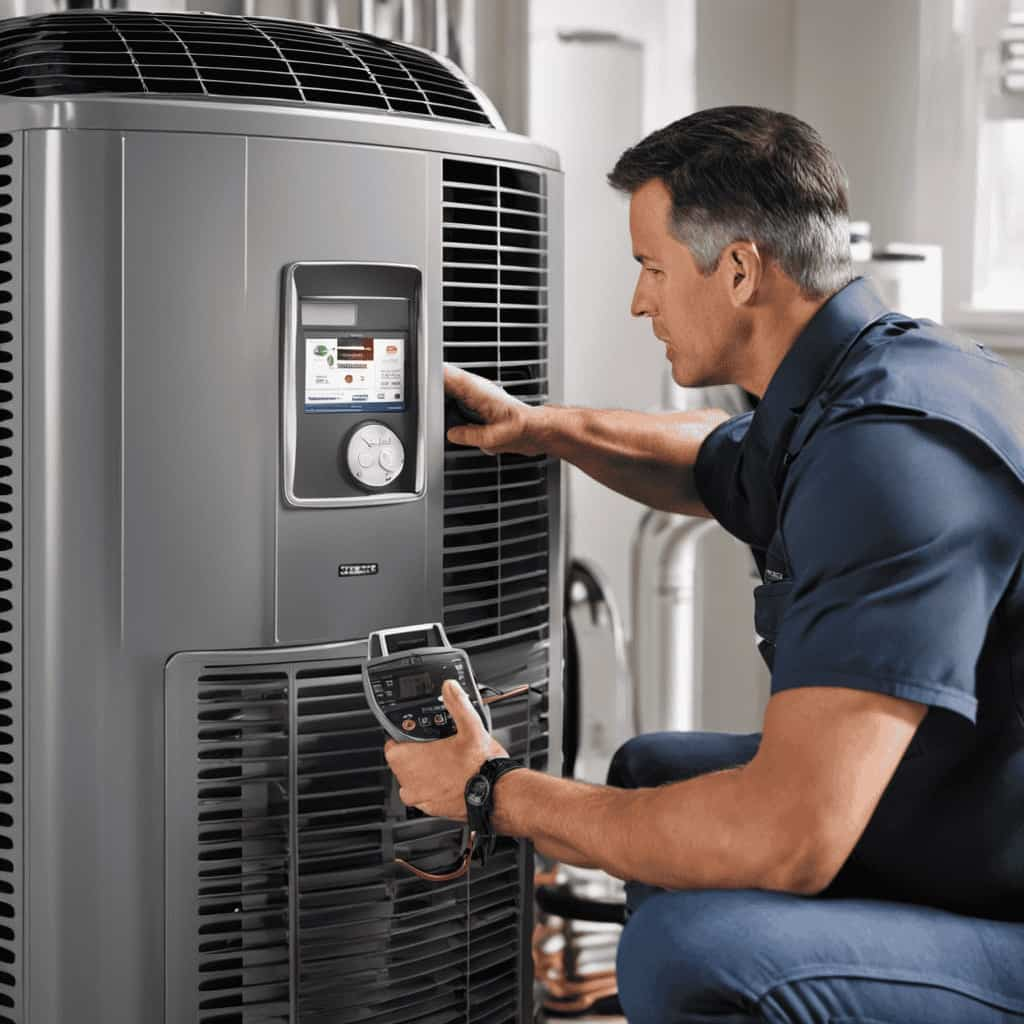
Consider using zone heating: By heating specific areas of your home instead of the entire space, you can further reduce energy consumption.
Use natural heating and cooling methods: Take advantage of natural sunlight and shade to help regulate the temperature in your home.
Regular Maintenance Checklist
To ensure optimal performance and longevity of our heat pump HVAC systems, it’s essential that we prioritize regular maintenance. Seasonal maintenance plays a crucial role in keeping our systems running efficiently and avoiding costly repairs.
Here is a checklist of maintenance tasks that should be performed regularly.

First, clean or replace the air filters to ensure proper airflow.
Second, inspect and clean the outdoor unit to remove any debris or obstructions.
Third, check the refrigerant levels and make sure they’re within the manufacturer’s specifications.
Lastly, troubleshoot any potential issues such as strange noises or inconsistent temperature output.

Seasonal Usage Strategies
We can save energy and reduce costs by implementing seasonal usage strategies for our heat pump HVAC systems. By developing energy-saving habits and performing seasonal maintenance, we can maximize the efficiency of our heat pump and ensure optimal performance throughout the year.
Here are five tips to help you save energy and improve your heat pump’s efficiency:
Adjust the thermostat: Set the temperature a few degrees lower during the winter and higher during the summer to reduce the workload on your heat pump.
Use programmable thermostats: Schedule temperature adjustments based on your daily routine to avoid unnecessary heating or cooling when you’re not at home.

Clean or replace air filters regularly: Clogged filters can restrict airflow and decrease the efficiency of your heat pump.
Seal air leaks: Inspect your home for drafts and seal any gaps or cracks to prevent heat loss in the winter and heat gain in the summer.
Schedule regular maintenance: Have a professional inspect and tune-up your heat pump annually to ensure it operates at peak efficiency.
Exploring Advanced Features in Heat Pump Technology
Let’s dive into the advanced features of heat pump technology. Heat pumps have come a long way in recent years, thanks to the integration of smart technology. These advanced features not only enhance the performance of heat pumps but also reduce their environmental impact.

One such feature is the smart thermostat, which allows homeowners to control their heat pump remotely and optimize energy usage. This helps in reducing energy consumption and lowering utility bills. Another advanced feature is variable-speed technology, which allows the heat pump to adjust its speed based on the heating or cooling demands of the space. This results in better comfort and energy efficiency.
Furthermore, heat pumps now come with advanced refrigerants that have a lower global warming potential, reducing their impact on the environment. These refrigerants are more efficient and contribute to reducing greenhouse gas emissions.
Let’s take a look at the table below for a summary of the advanced features in heat pump technology:
| Advanced Feature | Description |
|---|---|
| Smart Thermostat | Enables remote control and energy optimization |
| Variable-Speed Technology | Adjusts speed based on heating or cooling demands |
| Advanced Refrigerants | Lower global warming potential and reduced emissions |
With these advanced features, heat pumps are not only efficient but also environmentally friendly, making them an ideal choice for heating and cooling systems.

Troubleshooting Common Issues With Heat Pump HVAC Systems
When troubleshooting common issues with heat pump HVAC systems, it’s important to identify the root cause in order to implement effective solutions. Here are some troubleshooting techniques and common problems to be aware of:
Insufficient heating or cooling: Check if the thermostat is set correctly and if the air filters are clean. Also, make sure the outdoor unit is free of debris and the indoor vents are unobstructed.
Poor airflow: Inspect the air filters for clogs and clean or replace them if necessary. Check the ductwork for leaks or blockages that may restrict airflow.
Frozen outdoor unit: This could be due to low refrigerant levels, a faulty defrost control, or dirty coils. Consult a professional to diagnose and fix the issue.

Strange noises: Unusual sounds like rattling or squealing may indicate loose parts, worn-out belts, or motor issues. Have a technician inspect and repair the system.
Inconsistent temperatures: If some areas of your home are colder or hotter than others, it could be due to leaky ductwork, improper insulation, or issues with the zoning system.
By following these troubleshooting techniques, you can address common problems with heat pump HVAC systems. However, if these issues persist or become frequent, it might be worth considering upgrading to a high-efficiency heat pump.
SUBSEQUENT SECTION: ‘Upgrading to a High-Efficiency Heat Pump: Is It Worth It?’
Upgrading to a High-Efficiency Heat Pump: Is It Worth It?
If you’re considering upgrading to a high-efficiency heat pump, it’s important to assess whether it’s worth the investment.

One key factor to consider is the upgrading costs. High-efficiency heat pumps may have a higher upfront cost compared to standard models. However, they can provide significant long-term savings through reduced energy consumption.
By using advanced technology and better insulation, high-efficiency heat pumps can achieve higher energy efficiency ratings, resulting in lower energy bills.
Additionally, upgrading to a high-efficiency heat pump can have a positive environmental impact. These systems consume less energy and produce fewer greenhouse gas emissions compared to traditional heating systems.
This reduction in carbon footprint can contribute to a more sustainable future.
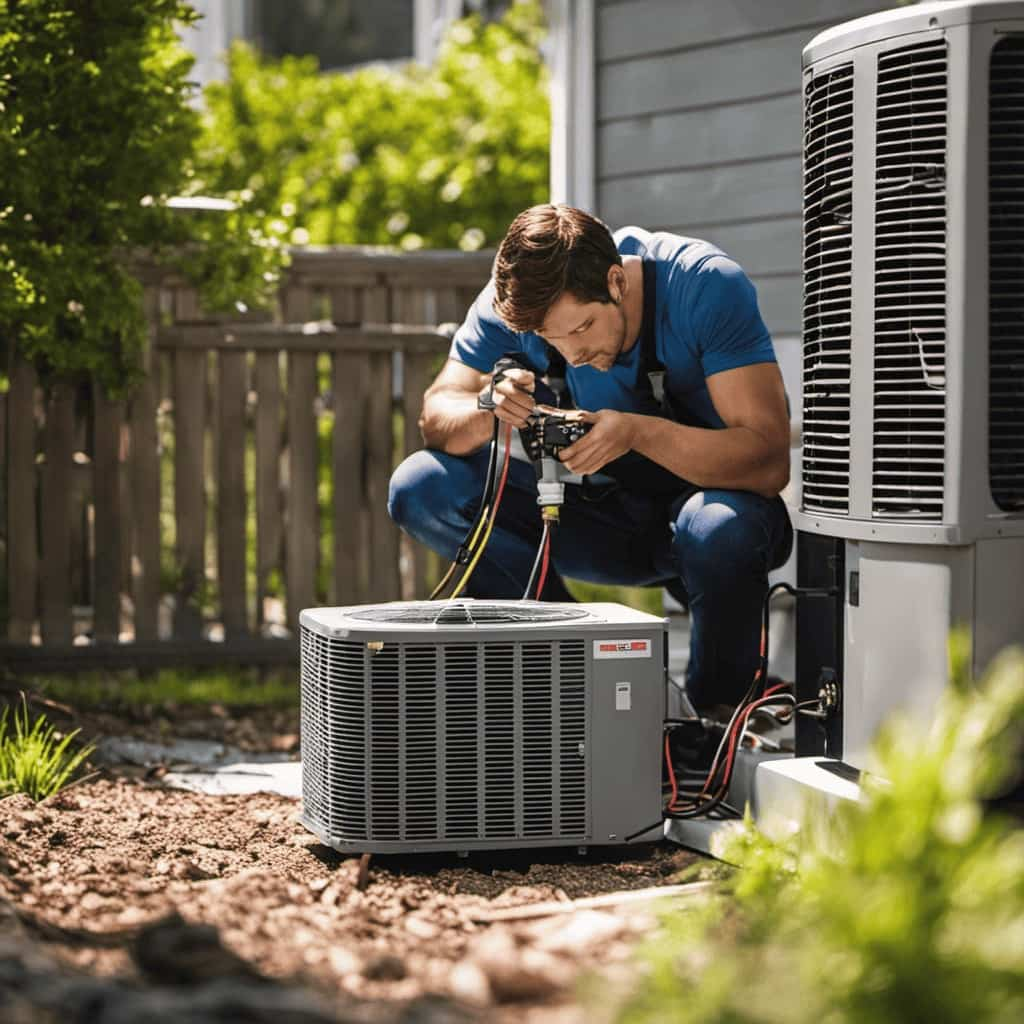
Therefore, considering the potential long-term savings and environmental benefits, upgrading to a high-efficiency heat pump is definitely worth considering.
Frequently Asked Questions
Can a Heat Pump HVAC System Be Used in All Climates?
Yes, a heat pump HVAC system can be used in all climates. However, it’s important to note that a geothermal heat pump is more suitable for colder climates due to its benefits in terms of efficiency and heating capacity.
How Long Does a Heat Pump HVAC System Typically Last?
Heat pump HVAC systems typically last around 15 to 20 years. Regular maintenance is key to prolonging their longevity. Following manufacturer’s guidelines and scheduling professional inspections can help prevent major breakdowns and ensure optimal performance.
Are There Any Government Incentives or Rebates Available for Installing a Heat Pump HVAC System?
Yes, there are government incentives and rebates available for installing a heat pump HVAC system. These incentives aim to promote energy savings and encourage the use of more efficient heating and cooling technologies.

Can a Heat Pump HVAC System Be Used to Heat Water as Well?
Yes, a heat pump HVAC system can be used to heat water as well. By utilizing the heat transfer process, it maximizes heating efficiency and reduces environmental impact by using renewable energy sources.
What Is the Average Cost of Installing a Heat Pump HVAC System?
The average cost of installing a heat pump HVAC system can vary depending on several factors. These factors include the size of the system, the complexity of the installation, and any additional components or upgrades required.
What Are Some Troubleshooting Tips to Maximize Efficiency in Heat Pump HVAC Systems?
To maximize efficiency in heat pump HVAC systems, implementing effective hvac heat pump troubleshooting tips is crucial. Start by regularly cleaning and replacing air filters to ensure proper air flow. Inspect the outdoor unit for debris or vegetation obstruction. Additionally, check the thermostat settings, electrical connections, and refrigerant levels. Regular professional maintenance and keeping an eye on these troubleshooting areas can help optimize heat pump efficiency.
What Factors Should I Consider When Selecting a Heat Pump for Maximum Efficiency?
When selecting a heat pump for maximum efficiency, it is crucial to consult a perfect heat pump selection guide. Factors to consider include the size of your space, energy efficiency ratings, heating and cooling capacity, and noise level. Additionally, evaluate the brand reputation, warranty coverage, and installation requirements. By following a comprehensive guide, you can make an informed decision and ensure optimal efficiency for your heating and cooling needs.
Conclusion
In conclusion, heat pump HVAC systems offer numerous benefits, including energy efficiency and cost savings.
For example, a case study conducted in a residential setting showed that by upgrading to a high-efficiency heat pump, the homeowner was able to reduce their energy consumption by 30% and save over $500 annually on their heating and cooling costs.
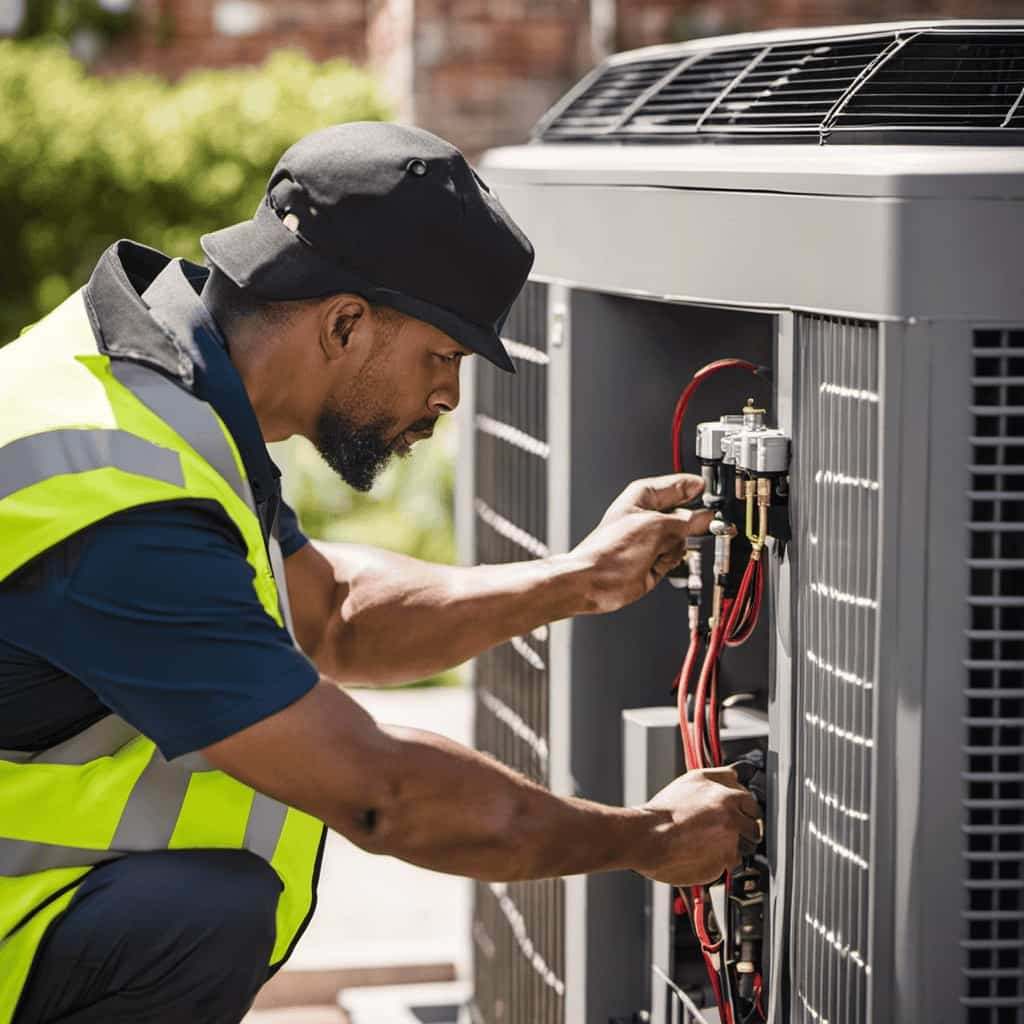
By understanding how to maximize efficiency, choosing the right size, and properly maintaining the system, homeowners can enjoy optimal performance and significant energy savings.
